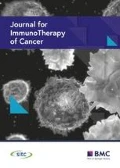Background
Our laboratory has discovered a 53-immune gene panel predictive of survival in patients with stage II-III melanoma[1]. Validation is planned using tissues from a multi-institutional cooperative group study. We tested the 53-immune gene panel using publicly available data for melanoma from The Cancer Genome Atlas (TCGA).
Methods
TCGA dataset for melanoma (n=407) was screened to determine two extreme groups of patients – alive at least 4 years (n=67) and dead within 2 years from diagnosis (n=59). Genome wide differential expression analysis was performed between the two groups to study our prognostic signature. We used gene set enrichment analysis (GSEA) to evaluate the activation status of the 53 gene panel as well as multiple immune lineage specific gene sets[2]. We used PAM clustering algorithm to define two groups based on the expression data of the 53 genes and performed survival analysis on the unsupervised patient clusters.
Results
Prognostic relevance of the 53 gene panel was tested using supervised and unsupervised approaches. First, the prognostic signature shows striking GSEA results (p=2.24e-5) with activation of 51 of the 53 immune genes in good prognosis patients, indicated by a right shift in the enrichment score (Figure 1). GSEA of immune lineage specific gene sets2 is shown in Figure 2. Using an unsupervised approach we studied the 53 gene panel across the whole population of melanoma cases with clinical and expression data reported in the TCGA (n=336). The generated heat map shows two distinct clusters of expression (Figure 3). A Kaplan Meier curve shows overall survival at 10 years in Cluster 1: 31.4 % and Cluster 2: 45.6%, (p =0.00261).

Figure 1

Figure 2

Figure 3
Conclusions
Using publically available data from TCGA we tested the 53-immune gene panel using supervised and unsupervised approaches, showing that 51 of the 53 genes are predictive of survival. This shows that the immune genes may be operative in different stages of melanoma. We propose using this panel to evaluate the effect of immunotherapy across melanoma cohorts, and have begun this analysis. We will also be evaluating the use of the 53 immune genes and the specific immune gene subsets on other cancer populations.
References
Sivendran S, et al: Dissection of immune gene networks in primary melanoma tumors critical for antitumor surveillance of patients with stage II-III resectable disease. JID. 2014, 134: 2202-11.
Bindea G, et al: Spatiotemporal dynamics of intratumoral immune cells reveal the immune landscape in human cancer. Immunity. 2013, 39: 782-95.
Author information
Authors and Affiliations
Rights and permissions
This article is published under an open access license. Please check the 'Copyright Information' section either on this page or in the PDF for details of this license and what re-use is permitted. If your intended use exceeds what is permitted by the license or if you are unable to locate the licence and re-use information, please contact the Rights and Permissions team.
About this article
Cite this article
Gartrell, R., Yingzhi, Q., Gonzalo, L. et al. Previously defined 53 immune gene panel predicts melanoma survival using The Cancer Genome Atlas (TCGA). j. immunotherapy cancer 3 (Suppl 2), P283 (2015). https://doi.org/10.1186/2051-1426-3-S2-P283
Published:
DOI: https://doi.org/10.1186/2051-1426-3-S2-P283

